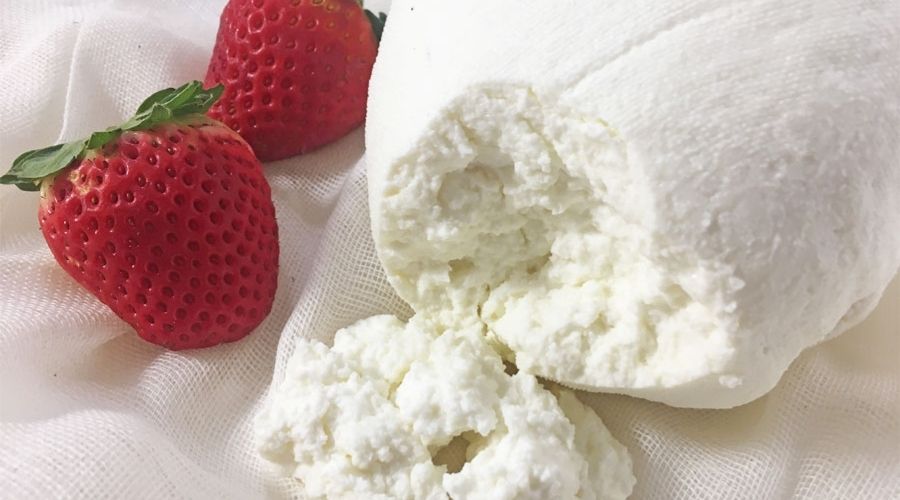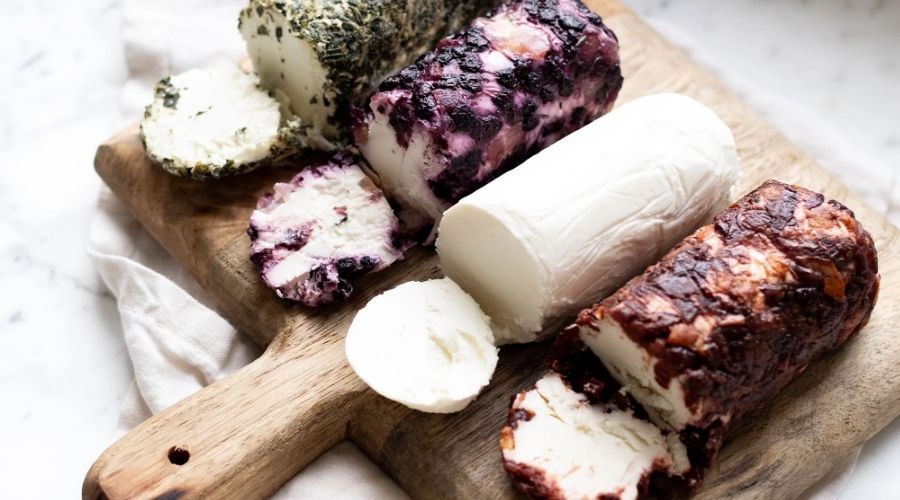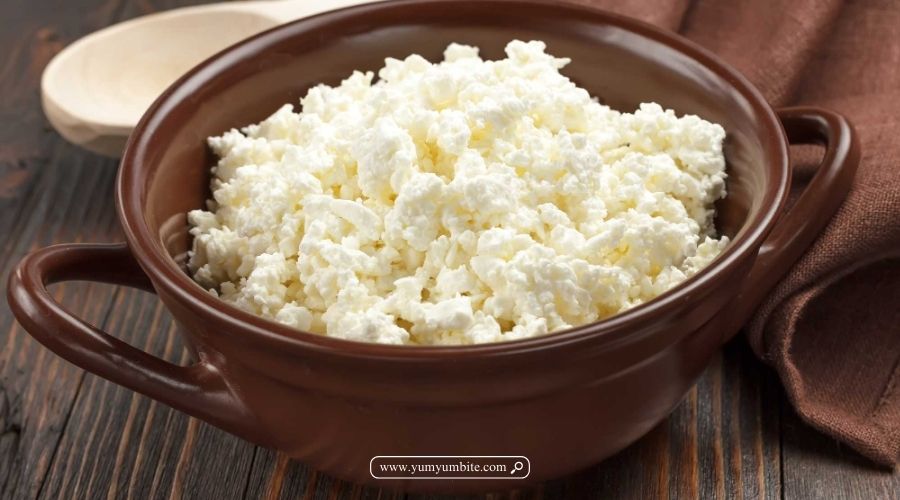Curd cheese is a staple ingredient in many kitchens, used in everything from savory dishes to creamy desserts.
However, it’s not always easy to find, and some may require a substitute due to dietary preferences or simply because it’s unavailable.
The good news is there are plenty of versatile and delicious alternatives that can replicate curd cheese’s texture and flavor in most recipes.
Whether you’re looking for dairy-free options, low-fat substitutes, or something you can quickly whip up at home, this guide will walk you through 12+ curd cheese substitutes that you can easily incorporate into your favorite meals.
From classic swaps like ricotta and cottage cheese to creative alternatives like tofu and Greek yogurt, you’ll find options suited for any dish.
12+ Versatile Curd Cheese Substitutes You Can Use Today
Finding the perfect curd cheese substitute doesn’t have to be a challenge.
Whether you’re making a savory quiche, a creamy cheesecake, or a light salad, these 12+ alternatives will ensure you can still enjoy your favorite recipes without compromising on taste or texture.
Each substitute offers its own unique benefits, from the tangy kick of Greek yogurt to the crumbly consistency of cottage cheese, providing flexibility based on your dietary needs and the recipe at hand.
So, next time you’re out of curd cheese or need a change, experiment with these substitutes and discover new ways to enhance your culinary creations!
Ricotta Cheese
Ricotta is a great substitute for curd cheese due to its similar texture and mild flavor. It works well in both savory and sweet dishes.
Ricotta is slightly creamier than curd cheese, making it ideal for recipes like lasagna, cannoli, and cheesecake.
When using ricotta, keep in mind that it can be a bit wetter than curd cheese. If you’re using it in a recipe that requires a firmer texture, like a pie filling, you might need to drain the ricotta before use.
This substitute is perfect for dishes that benefit from a light, creamy consistency.
Cottage Cheese

Cottage cheese is a widely available substitute for curd cheese, offering a similar curdy texture and mild taste. It’s a great option for savory dishes like dips, salads, and stuffed pasta.
Cottage cheese is also lower in fat than some other substitutes, making it suitable for lighter recipes.
One thing to consider is its moisture content—it may be slightly wetter than curd cheese, so you may need to drain it, especially for baked goods like cheesecakes or pastries.
Cottage cheese works well in both creamy and crumbly applications, giving you flexibility across different types of dishes.
Cream Cheese
Cream cheese is a richer, smoother alternative to curd cheese, making it ideal for recipes where a creamy texture is key, such as in cheesecakes, dips, and frosting.
Its tangy flavor can complement both sweet and savory dishes, although it’s denser and higher in fat than curd cheese.
If your recipe calls for a lighter, more crumbly texture, like in certain baked goods or savory pies, you may want to consider blending cream cheese with a bit of yogurt or ricotta to mimic curd cheese more closely.
Be cautious when using cream cheese in recipes that require a lighter consistency, as it can weigh down the final result.
Mascarpone
Mascarpone is a luxurious, creamy substitute for curd cheese, often used in desserts like tiramisu and frostings.
It has a very smooth, rich texture and a slightly sweet flavor, making it perfect for recipes where creaminess is essential.
However, mascarpone is significantly higher in fat than curd cheese, so it’s not ideal for low-fat dishes.
Its rich texture may also be too heavy for certain savory recipes where a lighter, crumblier cheese is needed. Mascarpone is best suited for indulgent desserts or creamy sauces where its richness can shine.
Greek Yogurt
Greek yogurt is a tangy and healthier alternative to curd cheese, particularly for those looking for a low-fat option.
Its thick and creamy consistency makes it a good choice for both sweet and savory dishes, such as dips, spreads, and even baked goods like cheesecakes or muffins.
Greek yogurt can be slightly more acidic than curd cheese, so if you’re using it in a delicate recipe like a quiche or souffle, you might want to balance out the tanginess by mixing it with a bit of cream or milk.
Greek yogurt is excellent for light, protein-packed dishes but might be too watery if not properly drained.
Farmer’s Cheese

Farmer’s cheese closely resembles curd cheese in both texture and taste, making it one of the best substitutes.
It’s mild, crumbly, and versatile, working well in a variety of dishes like pierogi fillings, blintzes, and cheesecakes.
Since it’s slightly drier than curd cheese, Farmer’s cheese can help maintain the right consistency in recipes that require a firm texture.
However, its drier nature may not be ideal for creamy dishes unless it’s combined with a wetter ingredient like sour cream or yogurt.
It is an excellent choice for Eastern European recipes or when a close match to curd cheese is needed.
Quark
Quark is a European dairy product that serves as a nearly identical substitute for curd cheese, both in texture and taste. It has a smooth, slightly tangy flavor that works beautifully in cheesecakes, savory tarts, and even breakfast dishes like pancakes or toast toppings.
Quark’s moisture content is similar to that of curd cheese, making it an easy swap in most recipes.
However, it may be harder to find outside of Europe, and it’s not as rich as some other options like mascarpone.
Quark is perfect for dishes where a mild and creamy cheese is needed, without overwhelming the recipe’s flavors.
Paneer
Paneer, an Indian cheese, is a great substitute for curd cheese, especially in savory dishes.
It has a firm, crumbly texture similar to curd cheese and a very mild flavor, which makes it a versatile ingredient in dishes like curries, stuffed breads, and salads.
Paneer doesn’t melt when heated, so it’s perfect for cooked dishes that require the cheese to hold its shape.
If using paneer in a dessert, you may need to blend or mash it to achieve a smoother texture.
Paneer is ideal for savory, firm-textured recipes but might be too dense for light or creamy desserts.
Feta Cheese
Feta cheese, known for its crumbly texture and tangy flavor, can be a strong substitute for curd cheese in savory dishes.
Its bold, salty taste works well in salads, tarts, and pastries, adding a punch of flavor that contrasts with milder ingredients.
While feta’s flavor is stronger than curd cheese, it can be toned down by soaking it in water for a few minutes before use.
Be cautious when using it in recipes where a mild flavor is essential, as feta might overpower other ingredients. Feta is best suited for Mediterranean dishes, savory pies, and salads.
Neufchâtel Cheese
Neufchâtel cheese is a soft, spreadable cheese that can replace curd cheese in many sweet and savory recipes. It has a similar texture to cream cheese but is lower in fat, making it a lighter option for cheesecakes, dips, or spreads.
Neufchâtel’s creamy consistency works well in recipes that require a smooth texture, but like cream cheese, it’s not as crumbly as curd cheese.
This substitute is perfect for baked goods, frostings, or any dish where a light, creamy cheese is preferred. It may not be ideal for recipes that need a firmer texture, such as certain casseroles or quiches.
Tofu (Silken or Firm)
For a dairy-free alternative, tofu is an excellent curd cheese substitute. Silken tofu, in particular, has a smooth and creamy consistency that works well in sauces, dips, and even desserts like vegan cheesecakes.
Firm tofu can be crumbled to mimic the texture of curd cheese in savory dishes such as scrambles, salads, or lasagna.
Tofu has a very neutral flavor, allowing it to take on the taste of surrounding ingredients, which makes it versatile.
When using tofu in place of curd cheese, especially in sweet recipes, you may need to blend it with a little sweetener or lemon juice to balance the flavor.
Goat Cheese

Goat cheese, with its tangy and slightly earthy flavor, can be a good substitute for curd cheese, especially in savory recipes.
It’s soft and creamy, making it suitable for spreads, salads, or baked dishes like quiches or stuffed vegetables.
The flavor of goat cheese is more pronounced than curd cheese, so it’s best used in recipes where a stronger cheese taste is desired.
If you’re looking for a milder flavor, you can opt for younger, softer varieties of goat cheese.
However, be cautious when using it in sweet recipes, as its tanginess may not complement sugary ingredients as well as curd cheese would.
Homemade Curd Cheese Substitute
Curd cheese is a versatile dairy product used in a variety of recipes, but it may not always be readily available.
Fortunately, you can make a simple and delicious substitute at home with just a few basic ingredients.
This recipe is easy to follow and results in a mild, crumbly cheese that can be used in both sweet and savory dishes, similar to traditional curd cheese.
Whether you’re baking, cooking, or whipping up a dip, this homemade alternative will provide the creamy texture and subtle flavor you need without the hassle of finding specialty cheese.
Ingredients:
- 4 cups of whole milk
- 2 tablespoons of lemon juice or white vinegar
- A pinch of salt (optional)
Instructions:
- Heat the Milk: Pour 4 cups of whole milk into a medium saucepan and heat it over medium heat. Stir occasionally to prevent the milk from scorching. Heat the milk until it reaches a light simmer, just below boiling, around 180°F (82°C). Small bubbles will start to form around the edges, but do not let it boil.
- Add the Acid: Once the milk reaches the desired temperature, turn off the heat. Slowly add 2 tablespoons of lemon juice or white vinegar to the milk while gently stirring. The acid will cause the milk to curdle, separating into curds and whey.
- Let it Sit: Allow the milk mixture to sit undisturbed for about 10 minutes. This gives the curds time to fully form.
- Strain the Curds: After 10 minutes, line a colander with a clean cheesecloth or kitchen towel and place it over a large bowl. Carefully pour the curdled milk into the colander, allowing the whey to drain away from the curds. If you want firmer curd cheese, let it drain for longer—up to an hour. For a softer texture, 20–30 minutes is enough.
- Rinse and Season: Once the curds have drained to your desired consistency, rinse them lightly under cool water to remove any residual acidity from the lemon juice or vinegar. Gently squeeze the cheesecloth to remove excess water. You can add a pinch of salt at this stage if you like a slightly savory flavor.
- Store or Use Immediately: Transfer your homemade curd cheese substitute to an airtight container if you’re not using it right away. It can be stored in the fridge for up to a week.
Making curd cheese substitute at home is an easy, rewarding process that requires minimal ingredients and effort.
With a little milk, acid, and patience, you can create a versatile cheese that works in a wide range of recipes, from savory casseroles and pasta dishes to sweet cheesecakes and desserts.
The fresh, mild flavor of this homemade version allows it to blend seamlessly into various dishes, providing a great alternative when curd cheese is unavailable.
Plus, the ability to adjust the consistency and salt levels means you can tailor the cheese to suit your specific recipe needs.
Try it today and elevate your homemade meals with this simple yet delicious cheese substitute!
What Can I Use Instead of Curd Cheese?
There are several alternatives to curd cheese, each offering a slightly different texture and flavor.
Common substitutes include ricotta cheese, cottage cheese, cream cheese, mascarpone, and Greek yogurt. The best substitute depends on the recipe you’re making.
For example, ricotta works well in baked goods like cheesecakes, while cottage cheese is better suited for savory dishes like salads or dips.
Always consider the texture and flavor you want to achieve when choosing a substitute.
Is Ricotta Cheese a Good Substitute for Curd Cheese?
Yes, ricotta cheese is an excellent substitute for curd cheese. Both cheeses have a mild flavor and similar texture, making ricotta a versatile replacement in many recipes.
Ricotta is slightly creamier than curd cheese, so it works particularly well in dishes like lasagna, baked goods, and creamy desserts.
However, if your recipe requires a firmer texture, you may need to drain the ricotta to remove excess moisture.
Can I Use Greek Yogurt Instead of Curd Cheese?
Greek yogurt can be used as a substitute for curd cheese, especially in dishes where a creamy, tangy flavor is desirable.
Its thick consistency makes it a good option for dips, spreads, and certain desserts.
However, Greek yogurt is more acidic and has a different texture compared to curd cheese, so it may not be suitable for all recipes, particularly those requiring a crumbly texture.
You might also need to adjust the acidity in the recipe to balance the flavors.
How Do I Replace Curd Cheese with Cottage Cheese?
Cottage cheese is a great substitute for curd cheese, particularly in savory dishes like salads, stuffed pasta, or savory bakes.
It has a mild flavor and similar curd-like texture, but cottage cheese tends to be wetter than curd cheese.
If you’re using it as a substitute, consider draining it to achieve the desired consistency. Cottage cheese works best in recipes that benefit from its moisture, such as dips or casseroles.
Can I Make a Curd Cheese Substitute at Home?
Yes, you can easily make a curd cheese substitute at home using basic ingredients like milk and an acid (lemon juice or vinegar).
By heating the milk and adding the acid, you can curdle the milk and create homemade curd cheese.
This method results in a soft, crumbly cheese that can be used in a variety of recipes, from savory dishes to desserts.
The homemade version can be customized to your liking, whether you want a firmer or softer texture.
References
- https://www.foodnetwork.com/how-to/packages/food-network-essentials/what-are-cheese-curds
- https://www.nigella.com/ask/alternative-to-curd-cheese-for-old-fashioned-cheesecake
- https://www.deliaonline.com/ask-lindsey/substituting-curd-cheese
- https://forums.moneysavingexpert.com/discussion/827007/curd-cheese-substitute
- https://www.reddit.com/r/Cooking/comments/8wj6g9/substitute_for_cheese_curds_for_poutine/


